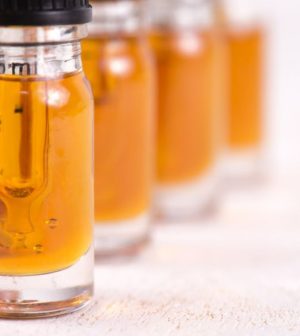- Could Your Grocery Store Meat Be Causing Recurring UTIs?
- Are You Making This Expensive Thermostat Error This Winter?
- Recognizing the Signs of Hypothyroidism
- 10 Strategies to Overcome Insomnia
- Could Artificial Sweeteners Be Aging the Brain Faster?
- Techniques for Soothing Your Nervous System
- Does the Water in Your House Smell Funny? Here’s Why
- Can a Daily Dose of Apple Cider Vinegar Actually Aid Weight Loss?
- 6 Health Beverages That Can Actually Spike Your Blood Sugar
- Treatment Options for Social Anxiety Disorder
CBD for Anxiety: Can It Help?

Anxiety disorder can make it hard to navigate life, but lately CBD has been touted as a natural treatment for the nerve-wracking condition.
You can buy CBD almost anywhere — gas stations, spas, farmers markets and grocery stores. It comes in many forms — from gummies to tablets to tinctures to lozenges and patches.
But is CBD good for anxiety?
Here, experts share their thoughts on whether the evidence supports CBD for anxiety.
What is CBD?
According to Harvard Health, CBD is an active ingredient found in the marijuana plant. However, CBD is typically derived from marijuana’s cousin, the hemp plant. CBD is not psychoactive, so it will not cause the “high” that THC from marijuana does. It is not believed to be addictive by itself. The hemp plant is legal, so CBD derived from hemp is considered to be legal.
CBD works by interacting with the body’s endocannabinoid (eCB) system. The endocannabinoid system acts as a neuromodulator for the body, Harvard Health says, and controls most neurotransmitter levels and activities. It also plays a role in the immune and gastrointestinal systems. Endocannabinoids and their receptors are found throughout the body. The eCB system integrates the perception of whether internal and external stimuli are stressful.
CBD and anxiety
According to the Anxiety and Depression Association of America, insufficient scientific evidence backs the claim that CBD is an effective treatment for depression or anxiety. That does not mean it would not help, but there simply haven’t been enough controlled clinical trials to support an indication of CBD for treating anxiety or depression. More research is required to evaluate CBD as a potential treatment for anxiety and depression, experts say.
But Staci Gruber, director of Marijuana Investigations for Neuroscientific Discovery (MIND) at Harvard’s McLean Hospital in Boston, recently co-authored a small study of 14 patients with moderate to severe anxiety that showed CBD’s promise: Following four weeks of treatment with full-spectrum CBD, the “patients reported reduced anxiety as well as improvements in mood, sleep, quality of life and measures reflecting their self-control and ability to think flexibly.” Even better, they experienced no serious adverse effects.
What do I need to know about buying CBD?
If choosing CBD for anxiety, there are important considerations to remember. CBD is a supplement, and so does not undergo the rigorous government testing that a drug does. So, as Gruber says, “buyer be aware.”
Understanding the difference between Whole Plant or Full Spectrum CBD, Broad Spectrum CBD and CBD Isolate Compound is helpful.
Full Spectrum CBD contains all the components of the cannabis plant, including tetrahydrocannabinol (THC) terpenes and flavonoids. The interplay between these components is thought to increase therapeutic benefits. In full-spectrum CBD, the amount of THC is less than 0.3%. THC is the psychoactive component of the cannabis plant known for the “high” associated with marijuana. The concentration of THC in a full-spectrum CBD product does not typically cause a “high” if a regular dose is used. The THC may result in a positive drug screening test, and it can cause problems if an individual has had previous issues with marijuana.
Broad Spectrum CBD is the same as full spectrum, except it goes through an additional process to remove the THC component. It still should not be considered 100% THC-free.
CBD Isolate is CBD that does not contain any other compounds, including THC, from the plant.
It is essential to ensure that an independent laboratory has verified the stated strength of CBD. Gruber advises that “avoiding products that contain toxins such as heavy metals, aflatoxins, mold or yeast is important.” This can also be verified by lab testing.
Check with a primary care doctor before taking CBD. It can interact with certain medications, especially blood thinners.
“Trying a CBD product with consultation from your doctor is less risky,” Dr. David Streem, a psychiatrist at the Cleveland Clinic said recently. “But you should still be aware of how the product makes you feel. If it makes you feel strange at all, stop using that product immediately.”
How much CBD for anxiety?
CBD products do not come in standardized doses. The dosing depends on your product type. For example, CBD Isolate would require a higher dose than the other types. Gruber recommends starting with a low dose, and gradually increasing the amount until reaching the desired effect.
Source: HealthDay
Copyright © 2026 HealthDay. All rights reserved.










